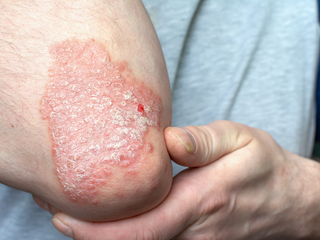Best Natural and Medical Treatments for Long-Term Psoriasis Relief
Psoriasis can feel like a puzzle with missing pieces — a skin condition that flares up without warning, stubbornly resists treatment, and doesn't just affect your skin. It seeps into your confidence, your routines, even your wardrobe. But here’s the good news: with the right combination of medical treatments and time-tested natural remedies, managing chronic psoriasis is absolutely possible.
In this guide, we’re exploring both proven natural remedies for psoriasis and effective medical treatments, so you can find the sweet spot that works for your body and your lifestyle. And if you’re wondering whether psoriasis ever truly goes away, this article dives into what remission can look like.
First, a Quick Story
A few years ago, someone reached out to us — let’s call her Sarah. She had been dealing with psoriasis since her teens. Steroids, OTC creams, dermatologist visits — she had tried them all. The patches would clear temporarily, but the side effects left her skin thin, reactive, and prone to even worse flares. She avoided swimming, wore full sleeves in the peak of summer, and felt emotionally drained.
Together, we unpacked the layers — her treatment history, diet, stress levels, and more. With a thoughtful blend of natural remedies and guidance from her dermatologist, Sarah found a routine that brought her flare-ups under control. Today, her psoriasis is no longer the loudest voice in the room — it’s manageable, and that’s a win worth celebrating.
What Is Psoriasis and Why Is It So Stubborn?
Let’s start with the basics. Psoriasis is a chronic autoimmune skin condition that speeds up skin cell turnover. Instead of the normal 28-day cycle, new skin cells form within days — but your body doesn’t shed the old ones fast enough. The result? Red, scaly patches that can itch, crack, and feel sore.
But here’s what many people don’t realize: psoriasis is much more than a surface-level issue. It’s linked to systemic inflammation and is associated with other conditions like psoriatic arthritis, heart disease, and even gut health imbalances. That’s why a holistic, multi-layered approach is essential for long-term relief.
Medical Psoriasis Treatments: What Works, and What Comes With Baggage
Modern medicine offers powerful tools to manage psoriasis symptoms — especially during flare-ups. But each comes with pros and cons, and knowing what to expect helps you make better decisions.
1. Topical Steroids
These are usually the first recommendation from dermatologists for localized flare-ups. They reduce inflammation and help control overactive skin cell growth. But they’re not meant for long-term use. Overusing topical corticosteroids can lead to skin thinning, rebound flares, and pigmentation changes — especially on sensitive areas like the face.
Tip: Save these for short-term support, not as your daily go-to.
2. Systemic Medications
These include oral or injectable drugs like Methotrexate or Cyclosporine, which suppress immune function to control severe psoriasis. While they can be highly effective, they come with potential side effects — from liver and kidney strain to immune suppression and fatigue. These need careful monitoring and regular lab tests.
3. Biologics
A game-changer for many, biologic therapies target specific immune responses that cause psoriasis. They're often used for moderate to severe cases, and many people see dramatic improvement. But biologics can lower overall immunity, making you more prone to infections and fatigue.
Key takeaway: Medical treatments are incredibly useful tools — especially during severe flare-ups — but long-term healing often requires support from natural psoriasis remedies that address inflammation, stress, and skin nourishment.
Natural Psoriasis Treatments That Actually Work
At Oleum Cottage, we deeply believe in the power of nature-led skincare. And when it comes to managing psoriasis, natural remedies often make the difference between surviving flare-ups… and preventing them altogether.
In fact, many people find relief only when they shift from short-term fixes to a more holistic approach that looks at internal inflammation, stress, and long-term skin support. If you’re currently stuck in the loop of reactive care — just treating flares as they come — it might be time to explore how a lifestyle-based, preventive plan can change everything.
Here are some tried-and-true, dermatologist-approved natural treatments that support your skin without the side effects.
1. Anti-Inflammatory Psoriasis Diet
Psoriasis is driven by internal inflammation — and your diet is one of the fastest ways to influence that.
What to eat:
-
Fatty fish (like salmon or sardines), walnuts, flaxseeds – rich in Omega-3 fatty acids that reduce inflammation
-
Bright-colored berries, leafy greens, turmeric – loaded with antioxidants
-
Whole grains and plant-based proteins for gut balance
What to avoid:
-
Refined sugar, dairy, and processed foods — common psoriasis flare-up triggers
-
Red meat and alcohol in excess, which increase systemic inflammation
Bonus tip: Try keeping a food diary to identify your personal triggers.
2. Natural Moisturizers: Coconut Oil & Aloe Vera
For topical comfort, nothing beats the simplicity of cold-pressed coconut oil and fresh aloe vera gel. Both provide deep hydration, soothe itching, and help reduce scaling.
-
Coconut oil has antimicrobial and anti-inflammatory properties, making it ideal for compromised skin barriers
-
Aloe vera is rich in polysaccharides that calm irritation and accelerate healing
Look for therapeutic-grade, fragrance-free, and additive-free versions — your skin deserves the purest care.
3. Vitamin D
Low levels of Vitamin D are commonly observed in psoriasis patients. This sunshine vitamin plays a key role in immune modulation and skin health.
You can:
-
Soak in early morning sun (10–15 mins daily)
-
Consider high-quality Vitamin D3 supplements after testing your levels
-
Use topical Vitamin D creams to reduce scaling and inflammation
4. The Mind-Body Connection
Stress is one of the most overlooked psoriasis triggers — but also one of the most manageable. Chronic stress activates inflammatory pathways and worsens flare-ups.
Simple daily practices that help:
-
Meditation or breathwork
-
Yoga, especially gentle yin or restorative flows
-
Progressive muscle relaxation to calm the nervous system
-
Journaling for emotional release
One of our customers once reduced her flare-ups significantly just by incorporating 10 minutes of meditation and switching to an anti-inflammatory breakfast.
Ayurvedic Treatment for Psoriasis: Ancient Wisdom, Modern Backing
One of the most profound holistic psoriasis treatment comes from the ancient Indian system of Ayurveda. In Ayurvedic texts, psoriasis is known as Kitibha — a result of imbalance in the Pitta (heat) and Kapha (toxicity) doshas.
The Ayurvedic approach focuses on detoxification, calming inflammation, and restoring energetic balance through herbs, diet, and daily rituals.
Key Ayurvedic herbs for psoriasis:
-
Turmeric (Curcumin): A proven anti-inflammatory and antioxidant. Curcumin supplements or turmeric teas can help calm immune overactivity. For topical use, mix turmeric with coconut oil for a healing mask.
-
Neem: This bitter herb has antifungal, antibacterial, and detoxifying properties. Neem oil soothes itching and irritation, while neem leaf supplements help cleanse the blood.
-
Aloe Vera + Sandalwood Paste: A classic Ayurvedic remedy for cooling the skin and reducing inflammation. Sandalwood’s natural fragrance also calms the mind — an added bonus.
Lifestyle tip: Start your day with warm water and lemon. It stimulates digestion, supports liver function, and may help reduce skin flare-ups by flushing toxins.
Aromatherapy for Psoriasis: Support Your Skin & Soothe Your Mind
Essential oils don’t just smell good — they can be powerful allies in psoriasis self-care. Used mindfully, they reduce stress, calm inflammation, and support skin regeneration.
Here are the best essential oils for psoriasis:
-
Lavender: Anti-inflammatory, calming, and gentle. Perfect for daily use in a diluted blend.
-
Tea Tree: Potent against bacteria and fungi — helpful if you experience cracked or infected skin.
-
Frankincense: Great for reducing inflammation and promoting cellular healing. Especially helpful during active flare-ups.
If you're looking for a blend that combines all three, our Restorative Oil for skin and scalp psoriasis brings together these essential oils in a skin-loving, ready to use perfect formulation — ideal for sensitive, flare-prone skin.
Safety first: Always dilute essential oils in a carrier oil (like jojoba, almond, or coconut) before applying to skin. Do a patch test first, especially if you have sensitive skin.
Aromatherapy isn’t just skin-deep. Inhaling essential oils activates the parasympathetic nervous system — which is where healing really begins.
A Balanced Psoriasis Treatment Plan: The Best of Both Worlds
If you’re wondering whether to go all-natural or stick to medical treatments, here’s our take: you don’t have to choose. The best psoriasis treatment plan is one that combines medical precision with natural, lifestyle-led healing.
A holistic approach might look like this:
-
Topical steroids or biologics for acute flare-ups — always under medical supervision
-
Anti-inflammatory diet and supplements to reduce internal triggers
-
Daily moisturization using natural oils to repair the skin barrier
-
Stress-reduction practices to lower flare frequency and severity
-
Targeted Ayurvedic or aromatherapy support based on your skin’s current state
Chronic psoriasis management isn’t about eliminating it entirely. It’s about creating a sustainable, soothing rhythm for your skin — one that respects its needs, responds to its signals, and rebuilds your confidence over time.
By blending the best of both worlds — science and nature, precision and ritual — you’ll find your way to long-term psoriasis relief that feels right and works for you.


